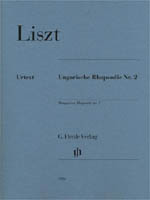Liszt, Franz (Jost) Hungarian Rhapsody No. 2
Piano Solos

-
Liszt, Franz (Jost)
Hungarian Rhapsody No. 2 (Jost)
Liszt's piano rhapsodies are in the same tradition as his transcriptions of opera or song themes, but in this case the point of departure is folk dances and songs. Liszt described no. 2 of his Hungarian Rhapsodies, published in 1851, as "truly Hungarian," and a "brilliant companion piece" to his own concert showpiece the Grand Galop chromatique. And indeed, the work, with its strong dynamic and harmonic contrasts, quickly became popular and remains among his best-loved keyboard works.The long-inaccessible autograph of the work is now available for consultation again - reason enough for undertaking a careful revision of Henle's Urtext edition. -the publisher
-
- Category: Piano Solos
- Item: 134657
- Grade/Level:
- Price: $17.95
-
(usually ships in 10 to 15 days)
